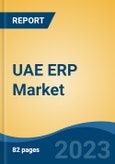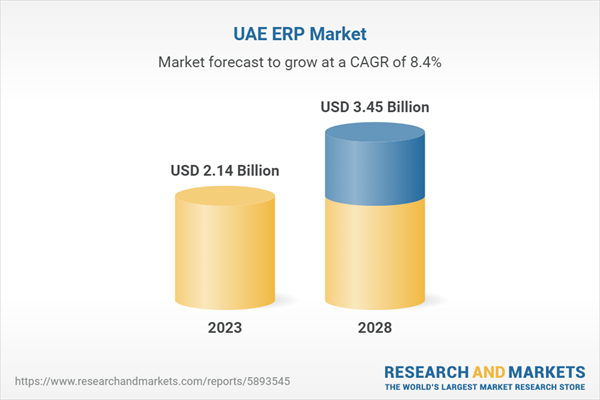Speak directly to the analyst to clarify any post sales queries you may have.
10% Free customizationThis report comes with 10% free customization, enabling you to add data that meets your specific business needs.
Enterprise Resource Planning (ERP) solutions are commonly used by organizations to manage their business in structural and standard way. In the current period, an ERP solution’s business functions have processed from minor aid and planning operations to whole business process integration, which includes major responsibilities and decision-making. An ERP software comprises several software modules, and every module concentration on certain business activities, including material purchasing, inventory control, accounting, finance, and HR. Also, to fulfil the needs of the companies, modules can be customized. The growing need for operational efficiency and transparency in business processes and escalating demand for ERP software from small & medium enterprises, are anticipated to drive the market growth. In addition, the growing adoption of cloud and mobile applications is estimated to progressively impact the growth of the market in the UAE. The high acceptance of ERP solutions in small and medium enterprises and the rapid change of modern business models are likely to provide better opportunities for the expansion of marketing planning resources in the coming years.
In conclusion, the country has shown tremendous results in the development of renewable energy, such as solar and wind, as well as other energy sources. This will impact the sales of ERP solutions in the region and thus, provide substantial growth in the UAE ERP market. The market is vastly encouraging with several companies providing energy-saving services in the region.
The Growing Acceptance of Cloud Computing
The acceptance of cloud computing is expected to increase the popularity of ERP solutions in UAE. ERP solution is expected to be dominated by cloud-based solutions. The implementation and operational cost of cloud-based solutions are comparatively less as compared to on-premises solutions. The business infrastructure and market size of small and medium size businesses are higher than large enterprise and thus, they prefer less costly and effective solution. Cloud based solutions fulfil the needs of such companies, and thus is expected to drive the UAE ERP market as well. Cloud ERP solution suggestions lower operational and implementation costs, automatic updates, easier and faster execution and maintenance, and complete mobility for users. These benefits make cloud ERP solutions more attractive to businesses, especially small and medium-sized businesses, and are expected to drive the growth of the UAE ERP market in the upcoming years.Need for Acquiescence with Government Authorities
The UAE government has started several procedures that require business to fulfil with specified requirements. Government provides facilities to various sectors such as healthcare, retail, finance, and manufacturing. ERP solutions can alleviate corporations to conform with these guidelines by requiring a single source of fact for all their data. This can help organizations to avoid penalties for non-acquiescence, and it can also help them to improve their efficiency and productivity. These regulations require healthcare suppliers to restrain precise records of persistent data, and also require them to report certain types of incidents to the government. ERP solutions can help healthcare providers to comply with these regulations by providing a centralized system for storing and managing patient data. The necessity for accordance with government policies is a major driver of the UAE ERP market. As the UAE government continues to implement new regulations, the demand for ERP solutions is expected to grow. In addition to the need for compliance, there are several other factors that are driving the growth of the UAE ERP market. These reasons include the growing demand for cloud-based ERP solutions, the rising demand from small and medium-sized businesses, and the strengthening accessibility of skilled IT professionals. The UAE ERP market is expected to grow at a high CAGR during 2024-2028. This growth is being led by a quantity of factors, including the necessity for accordance with government regulations. Some advantages that ERP solutions can provide corporations in UAE are stepped forward settlement with authorities’ regulations:
As mentioned above, ERP solutions can help businesses to comply with a wide range of government regulations. This can help businesses to avoid penalties and can help them to improve the efficiency of their operations. Increased efficiency and productivity: ERP solutions can help businesses to automate their business processes, which can lead to augmented efficiency and productivity. This can release up employees to focus on more strategic tasks, and it can also help businesses to reduce costs.Improved decision-making: ERP solutions can provide businesses with perceptions into their procedures that can help them to make better outcomes. This will lead to enhanced growth and cost effectiveness. Overall, ERP solutions can offer several advantages to corporations in the UAE. These advantages include better-quality in accordance with government instructions, increased efficiency and productivity, improved decision-making, and superior customer service. As the UAE government continues to employ new regulations, the demand for ERP solutions is expected to grow in the forecast period.
Rising Demand from Small and Medium-Sized Businesses
The rising demand from small and medium-sized businesses for ERP solution has significantly increased over the period. In recent time, small and medium-sized businesses have grown in substantial value in the UAE's economic landscape. These firms contribute to job creation opportunities, innovation, and overall economic growth. Recognizing the manifest of SMBs, the UAE government has numerous active offers and amendments to finance their development and urge entrepreneurship. Moreover, a growing number of small-medium businesses are arising through distinct sectors such as retail, manufacturing, healthcare, and services.With their growth, small & medium businesses (SMBs) encounter the challenge of operating complicated business practices, efficiently. ERP solutions are made for overcoming such situations. ERP software assimilates diverse functional spaces such as finance, sales, inventory management, human resources, and customer relationship management into an integrated platform. It enables firms to automate processes, increase data accuracy, and extend real-time insights into their operations.
The rising demand for ERP systems among SMBs in the UAE can be attributed to several factors. As we know, SMBs are progressively identifying the need for digital transformation to stay viable in an increasingly growing business environment. The SMBs understand that manual developments and unrelated advances impede progress and effectiveness. By implementing an ERP solution, SMBs can rationalize their operations, optimize resource allocation, and increase overall productivity. For ease of doing business and transparency, the government started promoting the utilization of ERP solutions to other firms in the recent year. The small firms are attempting to affiliate themselves with these initiatives and leverage government support, and thus have become more interested in buying ERP solutions. Small medium businesses (SMB) now have more knowledge of cloud-based ERP solutions, and how it will help them to enhance their business modules. Cloud ERP extends flexibility, scalability, and cost-efficiency, making it an ideal choice for SMBs with limited resources. Moreover, the UAE government's focus on digitalization and smart initiatives has further accelerated the adoption of ERP systems among small and medium businesses. In conclusion, the rising demand for ERP systems in the UAE is primarily driven by small and medium-sized businesses. These corporations’ evaluation the want for digital transformation, stepped forward operational performance, and actual-time insights. With government support, availability of cloud-based solutions, and increasing awareness of its benefits, firms are embracing ERP systems to unlock their full potential and drive growth in the UAE's dynamic business landscape.
Market Segments
UAE ERP Market is divided based on Component, Deployment Type, Function, End User, and Region. Based on Component, the market is further bifurcated into Software and Services. Based on Deployment Type, the market is divided into On-Premises and Cloud. Based on Function, the market is divided into Finance, Human Resource, Customer Management, Inventory Management, Supply Chain and Others. Based on End User, the market is divided into Manufacturing, BFSI, Healthcare, Retail, Government & Utilities, IT & Telecom, and Others. Based on region, the market is divided among Dubai, Abu Dhabi, Sharjah, and Rest of UAE.Market Players
Major market players of the UAE ERP Market are IBM Middle East FZ. LLC, SAP Middle East & North Africa (L.L.C), Oracle Corporation, Sage Software Middle East FZ-LLC, Doosan Heavy Industries UAE, Microsoft Gulf FZ LLC, Workday, Inc, Infor FZ LLC, Epicor Software Middle East Ltd and D2M Solutions Ltd (ESI Services).Report Scope:
In this report, UAE ERP Market has been segmented into following categories, in addition to the industry trends which have also been detailed below:UAE ERP Market, By Component:
- Software
- Services
UAE ERP Market, By Deployment Type:
- On-Premises
- Cloud
UAE ERP Market, By Function:
- Finance
- Human Resource
- Customer Management
- Inventory Management
- Supply Chain
- Others
UAE ERP Market, By End User:
- Manufacturing
- BFSI
- Healthcare
- Retail
- Government & Utilities
- IT & Telecom
- Others
UAE ERP Market, By Region:
- Dubai,
- Abu Dhabi
- Sharjah
- Rest of UAE
Competitive Landscape
Company Profiles: Detailed analysis of the major companies present in UAE ERP Market.Available Customizations:
UAE ERP with the given market data, the publisher offers customizations according to a company’s specific needs.This product will be delivered within 1-3 business days.
Table of Contents
Companies Mentioned
- IBM Middle East FZ. LLC
- SAP Middle East & North Africa (L.L.C)
- Oracle Corporation
- Sage Software Middle East fz-llc
- Doosan Heavy Industries UAE
- Microsoft Gulf FZ LLC
- Workday, Inc
- D2M Solutions Ltd (ESI Services)
- Epicor Software Middle East Ltd
- Infor FZ LLC
Table Information
| Report Attribute | Details |
|---|---|
| No. of Pages | 82 |
| Published | October 2023 |
| Forecast Period | 2023 - 2028 |
| Estimated Market Value ( USD | $ 2.14 Billion |
| Forecasted Market Value ( USD | $ 3.45 Billion |
| Compound Annual Growth Rate | 8.3% |
| Regions Covered | United Arab Emirates |
| No. of Companies Mentioned | 10 |









